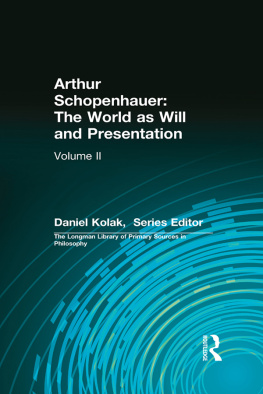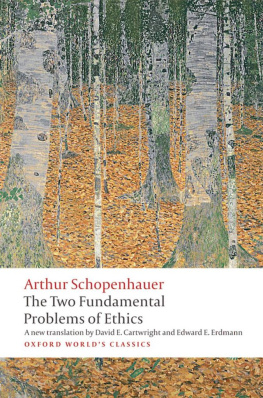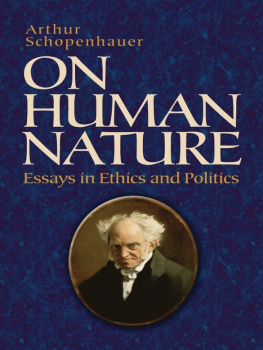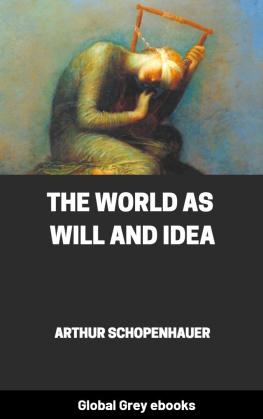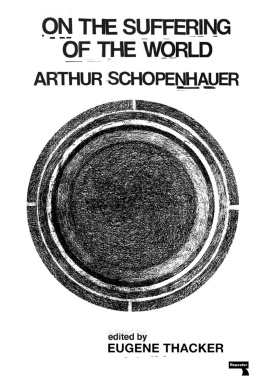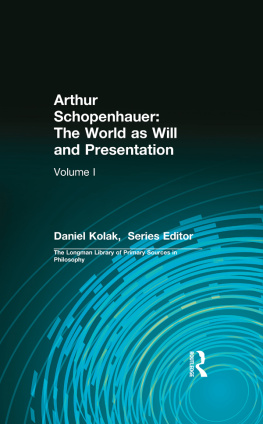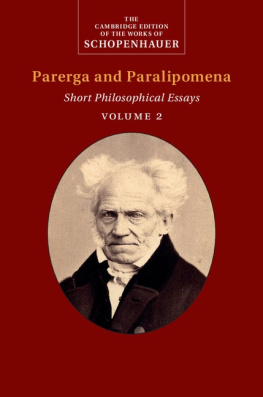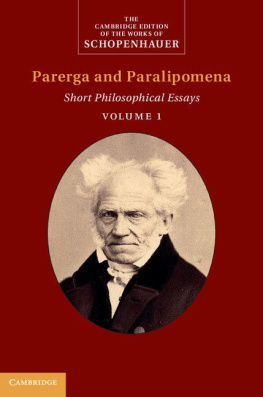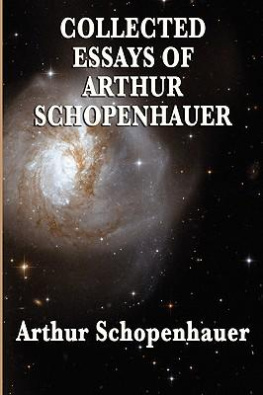Schopenhauer Arthur - Essays Religion
Here you can read online Schopenhauer Arthur - Essays Religion full text of the book (entire story) in english for free. Download pdf and epub, get meaning, cover and reviews about this ebook. genre: Religion. Description of the work, (preface) as well as reviews are available. Best literature library LitArk.com created for fans of good reading and offers a wide selection of genres:
Romance novel
Science fiction
Adventure
Detective
Science
History
Home and family
Prose
Art
Politics
Computer
Non-fiction
Religion
Business
Children
Humor
Choose a favorite category and find really read worthwhile books. Enjoy immersion in the world of imagination, feel the emotions of the characters or learn something new for yourself, make an fascinating discovery.
- Book:Essays Religion
- Author:
- Genre:
- Rating:3 / 5
- Favourites:Add to favourites
- Your mark:
- 60
- 1
- 2
- 3
- 4
- 5
Essays Religion: summary, description and annotation
We offer to read an annotation, description, summary or preface (depends on what the author of the book "Essays Religion" wrote himself). If you haven't found the necessary information about the book — write in the comments, we will try to find it.
Essays Religion — read online for free the complete book (whole text) full work
Below is the text of the book, divided by pages. System saving the place of the last page read, allows you to conveniently read the book "Essays Religion" online for free, without having to search again every time where you left off. Put a bookmark, and you can go to the page where you finished reading at any time.
Font size:
Interval:
Bookmark:
This eBook is for the use of anyone anywhere at no cost and with
almost no restrictions whatsoever. You may copy it, give it away or
re-use it under the terms of the Project Gutenberg License included
with this eBook or online at www.gutenberg.net
Title: The Essays of Arthur Schopenhauer; Religion, A Dialogue, Etc.
Author: Arthur Schopenhauer
Release Date: January 25, 2004 [eBook #10833]
Language: English
***START OF THE PROJECT GUTENBERG EBOOK THE ESSAYS OF ARTHUR SCHOPENHAUER; RELIGION, A DIALOGUE, ETC.***
and the Project Gutenberg Online Distributed Proofreading Team
PREFATORY NOTE
RELIGION: A DIALOGUE.
A FEW WORDS ON PANTHEISM.
ON BOOKS AND READING.
PHYSIOGNOMY.
PSYCHOLOGICAL OBSERVATIONS.
THE CHRISTIAN SYSTEM.
Schopenhauer is one of the few philosophers who can be generally understood without a commentary. All his theories claim to be drawn direct from the facts, to be suggested by observation, and to interpret the world as it is; and whatever view he takes, he is constant in his appeal to the experience of common life. This characteristic endows his style with a freshness and vigor which would be difficult to match in the philosophical writing of any country, and impossible in that of Germany. If it were asked whether there were any circumstances apart from heredity, to which he owed his mental habit, the answer might be found in the abnormal character of his early education, his acquaintance with the world rather than with books, the extensive travels of his boyhood, his ardent pursuit of knowledge for its own sake and without regard to the emoluments and endowments of learning. He was trained in realities even more than in ideas; and hence he is original, forcible, clear, an enemy of all philosophic indefiniteness and obscurity; so that it may well be said of him, in the words of a writer in the Revue Contemporaine, ce n'est pas un philosophe comme les autres, c'est un philosophe qui a vu le monde.
It is not my purpose, nor would it be possible within the limits of a prefatory note, to attempt an account of Schopenhauer's philosophy, to indicate its sources, or to suggest or rebut the objections which may be taken to it. M. Ribot, in his excellent little book, [Footnote: La Philosophie de Schopenhauer, par Th. Ribot.] has done all that is necessary in this direction. But the essays here presented need a word of explanation. It should be observed, and Schopenhauer himself is at pains to point out, that his system is like a citadel with a hundred gates: at whatever point you take it up, wherever you make your entrance, you are on the road to the center. In this respect his writings resemble a series of essays composed in support of a single thesis; a circumstance which led him to insist, more emphatically even than most philosophers, that for a proper understanding of his system it was necessary to read every line he had written. Perhaps it would be more correct to describe Die Welt als Wille und Vorstellung as his main thesis, and his other treatises as merely corollary to it. The essays in this volume form part of the corollary; they are taken from a collection published towards the close of Schopenhauer's life, and by him entitled Parerga und Paralipomena, as being in the nature of surplusage and illustrative of his main position. They are by far the most popular of his works, and since their first publication in 1851, they have done much to build up his fame. Written so as to be intelligible enough in themselves, the tendency of many of them is towards the fundamental idea on which his system is based. It may therefore be convenient to summarize that idea in a couple of sentences; more especially as Schopenhauer sometimes writes as if his advice had been followed and his readers were acquainted with the whole of his work.
All philosophy is in some sense the endeavor to find a unifying principle, to discover the most general conception underlying the whole field of nature and of knowledge. By one of those bold generalizations which occasionally mark a real advance in Science, Schopenhauer conceived this unifying principle, this underlying unity, to consist in something analogous to that will which self-consciousness reveals to us. Will is, according to him, the fundamental reality of the world, the thing-in-itself; and its objectivation is what is presented in phenomena. The struggle of the will to realize itself evolves the organism, which in its turn evolves intelligence as the servant of the will. And in practical life the antagonism between the will and the intellect arises from the fact that the former is the metaphysical substance, the latter something accidental and secondary. And further, will is desire, that is to say, need of something; hence need and pain are what is positive in the world, and the only possible happiness is a negation, a renunciation of the will to live.
It is instructive to note, as M. Ribot points out, that in finding the origin of all things, not in intelligence, as some of his predecessors in philosophy had done, but in will, or the force of nature, from which all phenomena have developed, Schopenhauer was anticipating something of the scientific spirit of the nineteenth century. To this it may be added that in combating the method of Fichte and Hegel, who spun a system out of abstract ideas, and in discarding it for one based on observation and experience, Schopenhauer can be said to have brought down philosophy from heaven to earth.
In Schopenhauer's view the various forms of Religion are no less a product of human ingenuity than Art or Science. He holds, in effect, that all religions take their rise in the desire to explain the world; and that, in regard to truth and error, they differ, in the main, not by preaching monotheism polytheism or pantheism, but in so far as they recognize pessimism or optimism as the true description of life. Hence any religion which looked upon the world as being radically evil appealed to him as containing an indestructible element of truth. I have endeavored to present his view of two of the great religions of the world in the extract which concludes this volume, and to which I have given the title of The Christian System. The tenor of it is to show that, however little he may have been in sympathy with the supernatural element, he owed much to the moral doctrines of Christianity and of Buddhism, between which he traced great resemblance. In the following Dialogue he applies himself to a discussion of the practical efficacy of religious forms; and though he was an enemy of clericalism, his choice of a method which allows both the affirmation and the denial of that efficacy to be presented with equal force may perhaps have been directed by the consciousness that he could not side with either view to the exclusion of the other. In any case his practical philosophy was touched with the spirit of Christianity. It was more than artistic enthusiasm which led him in profound admiration to the Madonna di San Sisto:
Sie trgt zur Welt ihn, und er schaut entsetzt
In ihrer Gru'l chaotische Verwirrung,
In ihres Tobens wilde Raserei,
In ihres Treibens nie geheilte Thorheit,
In ihrer Quaalen nie gestillten Schmerz;
Entsetzt: doch strahlet Rub' and Zuversicht
Und Siegesglanz sein Aug', verkndigend
Schon der Erlsung ewige gewissheit.
Font size:
Interval:
Bookmark:
Similar books «Essays Religion»
Look at similar books to Essays Religion. We have selected literature similar in name and meaning in the hope of providing readers with more options to find new, interesting, not yet read works.
Discussion, reviews of the book Essays Religion and just readers' own opinions. Leave your comments, write what you think about the work, its meaning or the main characters. Specify what exactly you liked and what you didn't like, and why you think so.


